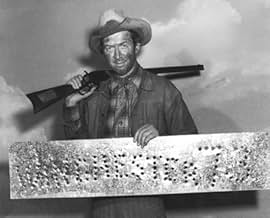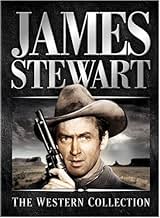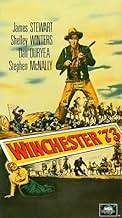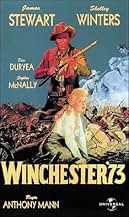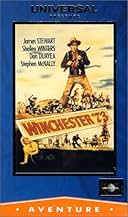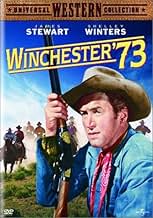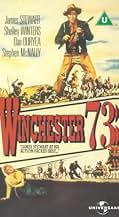VALUTAZIONE IMDb
7,6/10
23.397
LA TUA VALUTAZIONE
L'ossessione di un cowboy per un fucile rubato lo porta a colpi di pistola in un'odissea attraverso il Far West americano.L'ossessione di un cowboy per un fucile rubato lo porta a colpi di pistola in un'odissea attraverso il Far West americano.L'ossessione di un cowboy per un fucile rubato lo porta a colpi di pistola in un'odissea attraverso il Far West americano.
- Regia
- Sceneggiatura
- Star
- Premi
- 1 vittoria e 1 candidatura in totale
Tony Curtis
- Doan
- (as Anthony Curtis)
Victor Adamson
- Townsman
- (non citato nei titoli originali)
Robert Anderson
- Basset
- (non citato nei titoli originali)
Recensioni in evidenza
My favorite movie genre is the western, it's really the only movie genre that is of American origin. And despite Sergio Leone, no one does them quite like Americans.
Right at the top of my list of ten favorites westerns is Winchester 73. It was the first pairing and only black and white film of the partnership of director Anthony Mann and actor James Stewart. It was also a landmark film in which Stewart opted for a percentage of the profits instead of a straight salary from Universal. Many such deals followed for players, making them as rich as the moguls who employed them.
Anthony Mann up to this point had done mostly B pictures, noir type stuff with no real budgets. Just before Winchester 73 Mann had done a fine western with Robert Taylor, Devil's Doorway, that never gets enough praise. I'm sure James Stewart must have seen it and decided Mann was the person he decided to partner with.
In this film Mann also developed a mini stock company the way John Ford was legendary for. Besides Stewart others in the cast like Millard Mitchell, Steve Brodie, Dan Duryea, John McIntire, Jay C. Flippen and Rock Hudson would appear in future Mann films.
It's a simple plot, James Stewart is obsessed with finding a man named Dutch Henry Brown and killing him. Why I won't say, but up to this point we had never seen such cold fury out of James Stewart on screen. Anthony Mann reached into Jimmy Stewart's soul and dragged out some demons all of us are afraid we have.
The hate is aptly demonstrated in a great moment towards the beginning of the film. After Stewart and sidekick Millard Mitchell are disarmed by Wyatt Earp played by Will Geer because guns aren't carried in Earp's Dodge City. There's a shooting contest for a Winchester rifle in Dodge City and the betting favorite is Dutch Henry Brown, played with menace by Stephen McNally. Stewart, Mitchell and Geer go into the saloon and Stewart and McNally spot each other at the same instant and reach to draw for weapons that aren't there. Look at the closeups of Stewart and McNally, they say more than 10 pages of dialog.
Another character Stewart runs into in the film is Waco Johnny Dean played by Dan Duryea who almost steals the film. This may have been Duryea's finest moment on screen. He's a psychopathic outlaw killer who's deadly as a left handed draw even though he sports two six guns.
Another person Stewart meets is Shelley Winters who's fiancé is goaded into a showdown by Duryea and killed. Her best scenes are with Duryea who's taken a fancy to her. She plays for time until she can safely get away from him. Guess who she ultimately winds up with?
There are some wonderful performances in some small roles, there ain't a sour note in the cast. John McIntire as a shifty Indian trader, Jay C. Flippen as the grizzled army sergeant and Rock Hudson got his first real notice as a young Indian chief. Even John Alexander, best known as 'Theodore Roosevelt' in Arsenic and Old Lace has a brief, but impressive role as the owner of a trading post where both McNally and Stewart stop at different times.
Mann and Stewart did eight films together, five of them westerns, and were ready to do a sixth western, Night Passage when they quarreled and Mann walked off the set. The end of a beautiful partnership that produced some quality films.
Right at the top of my list of ten favorites westerns is Winchester 73. It was the first pairing and only black and white film of the partnership of director Anthony Mann and actor James Stewart. It was also a landmark film in which Stewart opted for a percentage of the profits instead of a straight salary from Universal. Many such deals followed for players, making them as rich as the moguls who employed them.
Anthony Mann up to this point had done mostly B pictures, noir type stuff with no real budgets. Just before Winchester 73 Mann had done a fine western with Robert Taylor, Devil's Doorway, that never gets enough praise. I'm sure James Stewart must have seen it and decided Mann was the person he decided to partner with.
In this film Mann also developed a mini stock company the way John Ford was legendary for. Besides Stewart others in the cast like Millard Mitchell, Steve Brodie, Dan Duryea, John McIntire, Jay C. Flippen and Rock Hudson would appear in future Mann films.
It's a simple plot, James Stewart is obsessed with finding a man named Dutch Henry Brown and killing him. Why I won't say, but up to this point we had never seen such cold fury out of James Stewart on screen. Anthony Mann reached into Jimmy Stewart's soul and dragged out some demons all of us are afraid we have.
The hate is aptly demonstrated in a great moment towards the beginning of the film. After Stewart and sidekick Millard Mitchell are disarmed by Wyatt Earp played by Will Geer because guns aren't carried in Earp's Dodge City. There's a shooting contest for a Winchester rifle in Dodge City and the betting favorite is Dutch Henry Brown, played with menace by Stephen McNally. Stewart, Mitchell and Geer go into the saloon and Stewart and McNally spot each other at the same instant and reach to draw for weapons that aren't there. Look at the closeups of Stewart and McNally, they say more than 10 pages of dialog.
Another character Stewart runs into in the film is Waco Johnny Dean played by Dan Duryea who almost steals the film. This may have been Duryea's finest moment on screen. He's a psychopathic outlaw killer who's deadly as a left handed draw even though he sports two six guns.
Another person Stewart meets is Shelley Winters who's fiancé is goaded into a showdown by Duryea and killed. Her best scenes are with Duryea who's taken a fancy to her. She plays for time until she can safely get away from him. Guess who she ultimately winds up with?
There are some wonderful performances in some small roles, there ain't a sour note in the cast. John McIntire as a shifty Indian trader, Jay C. Flippen as the grizzled army sergeant and Rock Hudson got his first real notice as a young Indian chief. Even John Alexander, best known as 'Theodore Roosevelt' in Arsenic and Old Lace has a brief, but impressive role as the owner of a trading post where both McNally and Stewart stop at different times.
Mann and Stewart did eight films together, five of them westerns, and were ready to do a sixth western, Night Passage when they quarreled and Mann walked off the set. The end of a beautiful partnership that produced some quality films.
The prize rifle of a drifter (James Stewart) is stolen by his nemesis (Stephen McNally), apprehended by a gun-trader (John McIntire), involved in a cavalry vs. Indian clash, winds up in the hands of a man who struggles with cowardice (Charles Drake) before being swiped by a charismatic outlaw (Dan Duryea). Meanwhile Lin McAdam (Stewart) pursues it with his faithful pardner (Millard Mitchell).
While "Winchester '73" (1950) was shot in flat B&W, it's a compelling action-packed Western with noir touches highlighted by the notable cast, which also includes Will Geer and Shelly Winters (when she was young, fit and voluptuous, not to mention spunky). Also look for Rock Hudson as the lead brave Young Bull and Tony Curtis as a besieged cavalry trooper.
The movie throws in Dodge City, Kansas, and a surprisingly congenial, almost bumbling (and too-old) Wyatt Earp (Geer) even though it's clear that the film was shot in southern Arizona. For instance, the saguaro cactus is native to the Sonoran Desert and not within 800 miles of Dodge City. But Tascosa, Texas, works okay within the framework of the Southwest, I guess. Basically, you have to ignore some misleading geography and a dubious Wyatt Earp to enjoy the picture.
The film runs 1 hour, 32 minutes, and was shot mainly in southern Arizona with studio stuff done at Universal Studios, California, with some exterior shots of Zion National Park, Utah.
GRADE: B.
While "Winchester '73" (1950) was shot in flat B&W, it's a compelling action-packed Western with noir touches highlighted by the notable cast, which also includes Will Geer and Shelly Winters (when she was young, fit and voluptuous, not to mention spunky). Also look for Rock Hudson as the lead brave Young Bull and Tony Curtis as a besieged cavalry trooper.
The movie throws in Dodge City, Kansas, and a surprisingly congenial, almost bumbling (and too-old) Wyatt Earp (Geer) even though it's clear that the film was shot in southern Arizona. For instance, the saguaro cactus is native to the Sonoran Desert and not within 800 miles of Dodge City. But Tascosa, Texas, works okay within the framework of the Southwest, I guess. Basically, you have to ignore some misleading geography and a dubious Wyatt Earp to enjoy the picture.
The film runs 1 hour, 32 minutes, and was shot mainly in southern Arizona with studio stuff done at Universal Studios, California, with some exterior shots of Zion National Park, Utah.
GRADE: B.
The traditional Western is synonymous with wide open spaces, clearcut morality, inevitable storylines, the optimistic faith in a hero's ability to shape his own destiny, to escape his past. These qualities reflect directly the American sense of self, the self-shaping Dream, the pushing of boundaries and frontiers, which is why the genre is still alluded to by opportunistic politicians. With some noble exceptions (eg Wellman, Hawks), the Western was healthily free of neuroses or real anxiety. Anthony Mann changed all that forever, and this first foray into the genre is one of the most violent, vivid, complex, not to say exciting Westerns ever made.
The traditional Western depends on a hero who exemplifies rugged wholesomeness, whatever misfortunes he may have had in the past, a supporter of order and right, who dominates the film, removes its obstacles, restores harmony in effect; and an obvious villain, who often, ironically, drives the plot, forces the hero into certain actions. The difference between the two is often delineated as mythically simple as the wearing of white or black hats.
Mann's background was in film noir, a genre antithetical to wide open spaces and optimism. Noir was neurotically charged, focusing on the dissolution of an unstable protagonist, where morality is blurred, the hero is as often the villain, trapped in an interior-labyrinth of his own making, a passive victim to destiny. Noir is about regress not progress, the interrogating and denying of modes and signs of representation, not the creation and confirmation of them.
WINCHESTER 73 is fraught with noir anxiety. Noir is often considered a psychological genre, visualising the traumas of its protagonist's head. 73 does this too, and is all the more disturbing in that that protagonist is lovely, homespun Jimmy Stewart, initiating here his great run of difficult films with Mann and Hitchcock. In many ways, good-natured and sweet, representing right and trying to restore disruptions to the natural order, he is also a near-lunatic who will stop at nothing to achieve murderous revenge, whose relentless quest mirrors Ethan Edwards in THE SEARCHERS in its inhuman persistance, whose human instincts are frayed by this quest, and whose bursts of violence are genuinely terrifying to witness.
As in noir, his anxiety has a psychological base - unlike most 'healthy' heroes who have outgrown (symbolically killed) their fathers, McAdam's father was killed before he could complete the process; his chasing his brother is less moral revenge than an anguished protest against stunted growth. The climactic shoot-out is not cathartic: McAdam staggers back into 'normal' society, like he's just witnessed some of the world's most ghastly horrors.
What is most unsettling about the film is that it's not really about a hero or a villain at all, but an inanimate piece of weoponry that drives the action. 73 opens with the gun of the title privileged, on display behind a glass window, while its admirers are trapped, squashed, undifferentiated, framed, admiring it outside. Throughout the film, human power is reduced to the most arbitrary of signifiers - names change; Lin and Dutch mime shooting each other because they've no guns; quests lose their moral vitality and their practitioners veer close to madness; armies have to ask for help from Confederate strangers to fight battles; a man becomes worthy of respect only when he mentions his name; another man is revealed as a coward when he abandons his fiancee to the Indians; the gun retains its prestige, power, wholeness.
It's not the revenge plot which drives the film, but the story of the gun; this wrenches the film out of conventional expectations, and creates an eerie, alienating, modern feel. We become so caught up in the revenge plot that when we follow, with the gun, another plot entirely, we feel slightly bewildered.
This emphasis on the gun, symbol of potent masculinity, actually allows for a critique of that masculinity, revealing pointless elaborate rituals at the expense of society and order; brute capitalist greed; murderous Indian-traders who defraud both seller and enemy; cowards; psychotic killers; before returning to its 'true' owner, a broken hero thoroughly compromised, who has become as murderous as the murderer he seeks. The gun is never imprinted with the name of its owner, not only because there is no fixed owner, but because there is no fixed masculinity, an insight anathema to the traditional Western.
73 brilliantly invokes Western myths - Wyatt Earp, Dodge City, the Cavalry, the Civil War, the wide open West - only to undermine them. Earp has an inflated reputation that is all name but never proven - Dodge City is no safer against outlaws than anywhere else; the Cavalry is inept (Custer has just lost Little Big Horn) and the bitter feud of the War is shown to be irrelevant. The myth of the open West is a site for a very closed, inescapable, circular plot which traps its characters, refuses to allow them shape their destiny, but allowing it to shape them.
The old John Ford silhouette of riders on a vast mountain is reprised, but signals here not progress but repetition and circularity. But for all its deconstruction, the film is also tangibly vivid in a way few Westerns ever achieve. Mann's incisive technique intrudes his camera in crucial positions, alternating revealing distance with intense examination, making the saloon doors and stagecoaches seem thrillingly alive and lived in.
The traditional Western depends on a hero who exemplifies rugged wholesomeness, whatever misfortunes he may have had in the past, a supporter of order and right, who dominates the film, removes its obstacles, restores harmony in effect; and an obvious villain, who often, ironically, drives the plot, forces the hero into certain actions. The difference between the two is often delineated as mythically simple as the wearing of white or black hats.
Mann's background was in film noir, a genre antithetical to wide open spaces and optimism. Noir was neurotically charged, focusing on the dissolution of an unstable protagonist, where morality is blurred, the hero is as often the villain, trapped in an interior-labyrinth of his own making, a passive victim to destiny. Noir is about regress not progress, the interrogating and denying of modes and signs of representation, not the creation and confirmation of them.
WINCHESTER 73 is fraught with noir anxiety. Noir is often considered a psychological genre, visualising the traumas of its protagonist's head. 73 does this too, and is all the more disturbing in that that protagonist is lovely, homespun Jimmy Stewart, initiating here his great run of difficult films with Mann and Hitchcock. In many ways, good-natured and sweet, representing right and trying to restore disruptions to the natural order, he is also a near-lunatic who will stop at nothing to achieve murderous revenge, whose relentless quest mirrors Ethan Edwards in THE SEARCHERS in its inhuman persistance, whose human instincts are frayed by this quest, and whose bursts of violence are genuinely terrifying to witness.
As in noir, his anxiety has a psychological base - unlike most 'healthy' heroes who have outgrown (symbolically killed) their fathers, McAdam's father was killed before he could complete the process; his chasing his brother is less moral revenge than an anguished protest against stunted growth. The climactic shoot-out is not cathartic: McAdam staggers back into 'normal' society, like he's just witnessed some of the world's most ghastly horrors.
What is most unsettling about the film is that it's not really about a hero or a villain at all, but an inanimate piece of weoponry that drives the action. 73 opens with the gun of the title privileged, on display behind a glass window, while its admirers are trapped, squashed, undifferentiated, framed, admiring it outside. Throughout the film, human power is reduced to the most arbitrary of signifiers - names change; Lin and Dutch mime shooting each other because they've no guns; quests lose their moral vitality and their practitioners veer close to madness; armies have to ask for help from Confederate strangers to fight battles; a man becomes worthy of respect only when he mentions his name; another man is revealed as a coward when he abandons his fiancee to the Indians; the gun retains its prestige, power, wholeness.
It's not the revenge plot which drives the film, but the story of the gun; this wrenches the film out of conventional expectations, and creates an eerie, alienating, modern feel. We become so caught up in the revenge plot that when we follow, with the gun, another plot entirely, we feel slightly bewildered.
This emphasis on the gun, symbol of potent masculinity, actually allows for a critique of that masculinity, revealing pointless elaborate rituals at the expense of society and order; brute capitalist greed; murderous Indian-traders who defraud both seller and enemy; cowards; psychotic killers; before returning to its 'true' owner, a broken hero thoroughly compromised, who has become as murderous as the murderer he seeks. The gun is never imprinted with the name of its owner, not only because there is no fixed owner, but because there is no fixed masculinity, an insight anathema to the traditional Western.
73 brilliantly invokes Western myths - Wyatt Earp, Dodge City, the Cavalry, the Civil War, the wide open West - only to undermine them. Earp has an inflated reputation that is all name but never proven - Dodge City is no safer against outlaws than anywhere else; the Cavalry is inept (Custer has just lost Little Big Horn) and the bitter feud of the War is shown to be irrelevant. The myth of the open West is a site for a very closed, inescapable, circular plot which traps its characters, refuses to allow them shape their destiny, but allowing it to shape them.
The old John Ford silhouette of riders on a vast mountain is reprised, but signals here not progress but repetition and circularity. But for all its deconstruction, the film is also tangibly vivid in a way few Westerns ever achieve. Mann's incisive technique intrudes his camera in crucial positions, alternating revealing distance with intense examination, making the saloon doors and stagecoaches seem thrillingly alive and lived in.
For the viewer who comes upon it long after its making, "Winchester '73" has something in common with "Casablanca." While you watch it, you get this feeling that you're looking at a string of clichés encountered so often in the genre; then you realise that the clichés became clichés only after being copied from this particular film, and that they were so widely copied because this film was so great. In other words, it's a seminal work.
"Winchester '73" is a joy to watch. The broad lines of the plot are somewhat predictable, but mostly because you've seen them copied so many times in later movies, and nevertheless it still contains a number of twists which surprise you. The dialogue, the pacing and Mann's direction are excellent. Stewart shines in particular, and if you're a fan this is a "must-see," but he is not alone in delivering a good performance. Remarkably, many of the most thoughtful and/or witty lines go to minor characters. Because this makes these characters (much) more than cardboard cutouts, it lent additional realism to the film.
This is a remarkably underrated film, and well worth keeping an eye out for. The DVD also contains an interview with Stewart which provides some background on the film.
"Winchester '73" is a joy to watch. The broad lines of the plot are somewhat predictable, but mostly because you've seen them copied so many times in later movies, and nevertheless it still contains a number of twists which surprise you. The dialogue, the pacing and Mann's direction are excellent. Stewart shines in particular, and if you're a fan this is a "must-see," but he is not alone in delivering a good performance. Remarkably, many of the most thoughtful and/or witty lines go to minor characters. Because this makes these characters (much) more than cardboard cutouts, it lent additional realism to the film.
This is a remarkably underrated film, and well worth keeping an eye out for. The DVD also contains an interview with Stewart which provides some background on the film.
There are several sections. The first is the set up - Jimmy Stewart and Millard Mitchell ride into town and run smack dab into Wyatt Earp, who takes their guns away, temporarily of course, or we'd have no movie. Then we see that Jimmy's looking for someone, and we get the gun shooting contest between him and his nemesis, Dutch Henry Brown, played by an evil evil Stephen McNally. We don't understand why Jimmy hates him so, or is hunting him. We also get a brief appearance by saloon gal Shelley Winters.
Then Jimmy gets jumped and he starts the real search of the film, this time for the Winchester he's won fair and square, but which the jealous Dutch steals. This is one of the first Winchesters, and it's considered very valuable, mention is made that only a few other people like President Grant have them.
Along the way, we meet a besieged U. S. army company, are attacked by Indians, see Shelley's boyfriend Charles Drake cringe in terror during the raid (he's very effective as a man haunted by his fear of confrontation and gorgeous to boot...Shelley is a fool to pick Jimmy, even if he isn't afraid of anything), and Dan Duryea pops in as Dutch's even MORE weaselly pal who has eyes for Shelley too. Finally, as we expected, Jimmy catches up with Dutch, but there is a twist that knocks my socks off every time, even though I've seen the movie before.
The Indian threat seems very real in this movie, and mention is made of Little Big Horn, which has just happened. The talk about the raid is not too embarrassing, although the Indian leader is played by Rock Hudson in full makeup, who I didn't recognize.
The supporting cast is superb, most notably John McIntire and Jay C. Flippen, who were to me the most intriguing members of the cast. I could have watched a whole movie of John McIntire playing cards, and another whole movie of Jay C. Flippen just sitting around reminiscing about the Civil War. Why couldn't they once just put these two guys in the front of a movie? They make it all work, along with Millard Mitchell, who is a lighthearted, loyal buddy to Jimmy, the man with the dark secret.
Then Jimmy gets jumped and he starts the real search of the film, this time for the Winchester he's won fair and square, but which the jealous Dutch steals. This is one of the first Winchesters, and it's considered very valuable, mention is made that only a few other people like President Grant have them.
Along the way, we meet a besieged U. S. army company, are attacked by Indians, see Shelley's boyfriend Charles Drake cringe in terror during the raid (he's very effective as a man haunted by his fear of confrontation and gorgeous to boot...Shelley is a fool to pick Jimmy, even if he isn't afraid of anything), and Dan Duryea pops in as Dutch's even MORE weaselly pal who has eyes for Shelley too. Finally, as we expected, Jimmy catches up with Dutch, but there is a twist that knocks my socks off every time, even though I've seen the movie before.
The Indian threat seems very real in this movie, and mention is made of Little Big Horn, which has just happened. The talk about the raid is not too embarrassing, although the Indian leader is played by Rock Hudson in full makeup, who I didn't recognize.
The supporting cast is superb, most notably John McIntire and Jay C. Flippen, who were to me the most intriguing members of the cast. I could have watched a whole movie of John McIntire playing cards, and another whole movie of Jay C. Flippen just sitting around reminiscing about the Civil War. Why couldn't they once just put these two guys in the front of a movie? They make it all work, along with Millard Mitchell, who is a lighthearted, loyal buddy to Jimmy, the man with the dark secret.
Lo sapevi?
- QuizJames Stewart credited this film with saving and redefining his career after a series of postwar flops threatened to seriously damage it.
- BlooperThis movie is based on a rifle-shooting competition held in Dodge City on 4 July 1876. During a poker game in the movie, Dutch refers to a "Dead Man's Hand". This refers to the poker hand 'Wild Bill' Hickok was holding when he was shot in the back by Jack McCall on 2 August 1876 - less than a month later. It was too soon for the "Dead Man's Hand" to be a famous phrase. However, per IMDb guidelines for Anachronisms, "a good deal of leeway" is allowed; linguistic anachronisms are usually excused (modern words in historical films) - "always bear in mind that it's entertainment not documentary."
- Citazioni
Wyatt Earp: That's Dutch Henry Brown. I thought you said you didn't know him.
Lin McAdam: I said I didn't recall the name.
- Curiosità sui creditiThe film's opening prologue states: This is a story of the Winchester Rifle Model 1873 "The gun that won the West" To cowman, outlaw, peace officer or soldier, the Winchester '73 was a treasured possession. An Indian would sell his soul to own one . . .
- ConnessioniFeatured in Mac Arthur il generale ribelle (1977)
I più visti
Accedi per valutare e creare un elenco di titoli salvati per ottenere consigli personalizzati
- How long is Winchester '73?Powered by Alexa
Dettagli
- Data di uscita
- Paese di origine
- Sito ufficiale
- Lingua
- Celebre anche come
- Winchester 73
- Luoghi delle riprese
- Azienda produttrice
- Vedi altri crediti dell’azienda su IMDbPro
Botteghino
- Lordo in tutto il mondo
- 3172 USD
- Tempo di esecuzione1 ora 32 minuti
- Colore
- Proporzioni
- 1.37 : 1
Contribuisci a questa pagina
Suggerisci una modifica o aggiungi i contenuti mancanti

Divario superiore
By what name was Winchester '73 (1950) officially released in India in English?
Rispondi
